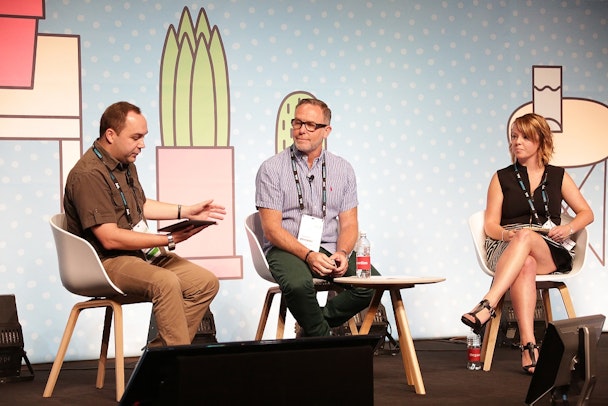What marketers need to know about virtual reality
Why virtual reality is here to stay, and about to hit it its first billion dollar year, was the topic discussed by Framestore co-founder and chief creative officer Mike McGee and Adam&Eve/DDB's interactive lead Karen Boswell at Cannes Lions this weekend. Here's what marketers need to know about the technology.

Image by Julian Handford
Virtual Reality is not a passing fad
As virtual reality (VR) teeters on the edge of its first billion-dollar year in 2016, marketers should take note that while some technology might have a shelf life, VR is here to stay.
According to Deloitte Global, VR will hit $700m in hardware sales in 2016, and a further $300m coming from content. The company also estimates that around 2.5 million VR headsets and 10 million game copies will be sold this year.
“Goldman Sachs has predicted that the virtual reality (VR) market will outpace the TV market in annual revenue by 2025, making VR bigger than TV,” said Karen Boswell, interactive lead at Adam&EveDDB during a panel hosted by The Drum’s editor Stephen Lepitak during Cannes Lions 2016. “The banking firm said that the VR market will generate $110bn dollars compared to TV’s $99bn in 10 years.”
Boswell added that the agency’s client John Lewis will be stocking VR headsets this Christmas as consumers become more aware of VR and the experiences available at their fingertips.
VR says more than TV
While the medium of TV can offer a great story, VR has the capability to offer consumers an immersive experience, which for a brand is exponentially beneficial when it comes to affiliation and recognition. Take for example Game of Thrones; while the TV show already has a global following its showrunners wanted to offer viewers, and potential fans, a more in depth brand experience and so it worked with VR studio Framestore to create a virtual reality experience that actually put them in the show. The 360-degree content allowed the user to enter the elevator in ‘Castle Black’ and ascend ‘The Wall’, two iconic locations within Game of Thrones universe. The experience used wind machines, rumble packs and real elevators to simulate the feeling of scaling a 700ft wall.
“VR is an evolution of storytelling, it’s a new platform that needs storytelling and innovation,” said Mike McGee, co-founder and chief creative officer at Framestore. “Storytellers for years have been trying to immerse us in films… we are really excited about bringing all of everything around storytelling and visual effects in to the world of virtual reality and augmented reality.
“Virtual reality is truly immersive, it blocks out the real world, you put headphones on and you are truly transported to whatever that place is inside the VR world.”
VR is also useful for brands who want to “engage rather than just broadcast” added Boswell. “Just as with a TV script, a good VR experience is and always will be, about the right creative idea, executed with the right craft. When created properly, VR can be a brilliantly enhanced way of not only telling your story but bringing an audience into your story, which is powerful for brands who want to engage rather than just broadcast.”
How to avoid bad ideas
Don’t choose VR for no reason. As with any marketing, following the crowd just to create VR for VR’s sake won’t reap you any rewards, offered Boswell.
“The worst idea, as with any [form of] marketing is one that isn’t really an idea at all. The question I get at least once a week is ‘Can I have a VR thingy?' Often in a client’s mind a VR thingy is simply taking a TV script, or a film that’s been shot in 3D and ‘turning it into VR’. That’s the starting point of the conversation, but this is good, because what it’s telling us is that VR is being considered, it’s just not quite understood yet.
“VR is an exceptional storytelling medium for all the reasons we highlighted, so I’m always keen to work with our clients to help them understand how to consider what the branded experiences could be and move them on from a linear storytelling mindset, that’s what TV is for.”

